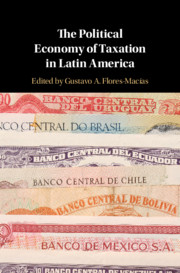Crossref Citations
This Book has been
cited by the following publications. This list is generated based on data provided by Crossref.
Grünewald, Aline
2022.
Power consolidation with welfare designs? The emergence of old-age pensions in nondemocratic regimes around the world.
Democratization,
Vol. 29,
Issue. 2,
p.
379.
Arza, Camila
Castiglioni, Rossana
Franzoni, Juliana Martínez
Niedzwiecki, Sara
Pribble, Jennifer
and
Sánchez-Ancochea, Diego
2022.
The Political Economy of Segmented Expansion.
Barlow, Matt
2023.
Export taxes in Argentina: Embedded ideas of state interventionism.
Economy and Society,
Vol. 52,
Issue. 4,
p.
602.
Tyburski, Michael D.
2023.
Remittances and Revenue in Latin America, 1990–2017.
Studies in Comparative International Development,
Mena Aguilar, Oswaldo A.
2024.
Advocacy coalitions or pragmatic coupling of streams? Explaining policy change in Mexico: The tax reforms of Vicente Fox and Enrique Peña (2001 and 2013).
Policy Studies Journal,
Arza, Camila
Castiglioni, Rossana
Franzoni, Juliana Martínez
Niedzwiecki, Sara
Pribble, Jennifer
and
Sánchez-Ancochea, Diego
2024.
La economía política de una expansión segmentada.
Castañeda, Néstor
2024.
Fairness and Tax Morale in Developing Countries.
Studies in Comparative International Development,
Vol. 59,
Issue. 1,
p.
113.



